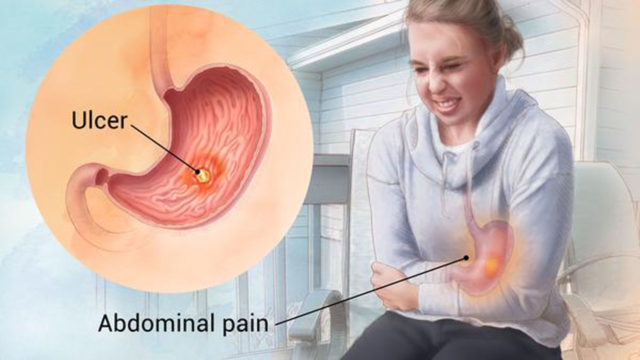For many people across Nigeria and Africa, living with a stomach ulcer is not only painful but also challenging to manage, especially when it comes to daily food and lifestyle choices. That burning sensation in the belly that simply won’t subside can disrupt work, social activities, and even sleep. Although stomach ulcers might seem like a distant issue to those who have not experienced them, for many Nigerians, the pain is very real. Medical experts say that ulcers in the stomach, known medically as “peptic ulcers,” typically result from a combination of causes—most commonly infection by the bacterium Helicobacter pylori (H. pylori) or from irritation due to the excess production of stomach acid.
In a region where spicy foods and “hard drinks” are popular, and the pressures of urban life keep stress levels high, stomach ulcers require careful management. Dr. Chinonso Egemba, known to many as Aproko Doctor, recently spoke out on Instagram about crucial habits and foods to avoid for those suffering from ulcers. Drawing from his statements and the experiences shared by everyday Nigerians, here’s an in-depth look at nine items you should steer clear of if you’re living with an ulcer, plus guidance on how to navigate daily life with this condition.
African Experience: The Pain and Prevalence of Ulcers
Ulcers affect millions on the continent. While there are no exact recent numbers, a 2019 study done at University College Hospital, Ibadan, found that 30-40% of people presenting with chronic abdominal pain tested positive for peptic ulcers. Nutritionists and pharmacists in Lagos agree: the combination of local dietary patterns—heavy pepper use, carbonated beverages (popularly known as “minerals”), and occasional overuse of painkillers—can trigger or worsen ulcers. Add stress, fast-paced Lagos life, and the high rate of self-medication, and you see why ulcers are a public health concern, not just an individual ailment.
1. Carbonated Drinks: Why “Minerals” are a No-Go
Whether you call them “minerals,” “soft drinks,” or just “sodas,” their bubbles aren’t so harmless for ulcer patients. According to Dr. Egemba, the fizz in these drinks increases stomach acid, contributing to gas, bloating, and further irritation of ulcerated stomach lining. A pharmacist at Yaba Market told us, “People drink Coke or Fanta to get relief from hunger pangs, but it often makes stomach problems worse.” Water remains the safest choice if you’re prone to ulcers.
2. Coffee: Proceed with Caution
For many, coffee is a morning ritual, but if you have an ulcer, it could make symptoms even worse. The caffeine content in coffee stimulates acid production in the stomach, leading to increased pain and potentially slowing the healing process. If you can’t start your day without a hot drink, try switching to herbal teas without caffeine, like ginger or hibiscus (zobo), though even these should be consumed in moderation if you notice discomfort.
3. Spicy Foods: The West African Dilemma
Pepper soup, suya, ata rodo, and other spicy delights are at the heart of Nigerian and Ghanaian cuisine. Yet, these foods can inflame the sensitive stomach lining, aggravating ulcer pain and symptoms. Ulcer patients, like Mrs. Bisi A., a caterer from Ibadan, say they have to “moderate” the amount of pepper in their food and look for alternative flavorings like herbs or vegetables. According to Lagos-based gastroenterologist Dr. Ugochukwu Onuoha, “Not everyone with an ulcer reacts to spice, but it’s a frequent culprit we see in hospitals.”
4. Chocolate: Not Always Sweet for Ulcer Sufferers
Chocolate may be a comfort food for some, but for those with ulcers, it’s often a source of discomfort. The caffeine and other compounds in chocolate can boost stomach acid secretion, triggering pain or burning. Health experts advise checking the ingredients list on snacks and treats—many biscuits and drinks sold in markets contain chocolate or cocoa powder that can be problematic for sensitive stomachs.
5. Citrus Fruits: Acidic Troublemakers
Oranges, lemons, and limes are popular in West Africa, especially as thirst-quenchers on hot days. However, their high acidity can lead to heartburn and irritation in people living with ulcers. Street vendor Musa A., who sells oranges at Mile 12 market, notes, “Some customers always ask, ‘Is this sweet or sour?’ After they buy, they’ll tell me, ‘Abeg, my doctor say make I no chop orange today.’” If you’re at risk for ulcers, try milder fruits like bananas or pawpaw (papaya) for your vitamin C.
6. Alcohol: Double Trouble for the Stomach
Alcohol remains a popular part of social life in Nigeria and Ghana, but it’s a major threat for ulcer patients. Alcohol not only irritates but can also erode the protective layer of mucus lining the stomach, making ulcers worse and healing more difficult. Dr. Egemba warns that “chronic alcohol consumption is a key risk factor we see among patients presenting with ulcer complications.” Reducing or eliminating alcohol can go a long way in preventing flare-ups.
7. Smoking: Another Hurdle to Healing
Though the dangers of smoking are well known, many don’t realise how severely it affects ulcer recovery. Smoking reduces blood flow to the stomach lining, impeding the body’s natural healing processes. Smokers living with ulcers tend to have longer recovery periods and are more likely to experience recurring symptoms. Local health officials, including Nigeria’s Ministry of Health, continue to urge both young and old to avoid tobacco, especially if you suffer from peptic ulcers.
8. Common Pain Medications: NSAIDs and Ulcer Risk
Common over-the-counter painkillers such as aspirin, ibuprofen, and diclofenac, collectively known as Non-Steroidal Anti-Inflammatory Drugs (NSAIDs), are widely used across West Africa for headaches, fevers, and body pain. However, according to Nigerian hospital pharmacists, indiscriminate use of these drugs can damage the stomach lining and may actually cause ulcers or worsen existing ones. Dr. Femi Omisore, a family doctor in Abuja, stated, “We always try to advise patients to ask their doctor for alternatives if they have a history of ulcers, because NSAIDs can be dangerous.”
9. Stress: The Invisible Agitator
While it’s a common belief that stress causes stomach ulcers, the medical community clarifies that stress mostly worsens symptoms or delays healing. Stress increases stomach acid and decreases the body’s ability to repair itself. In Nigeria, Lagosians and city dwellers across West Africa confess the challenge of managing stress: from the stressful “go-slow” (traffic jams) to dealing with economic uncertainty. Mental health experts recommend stress management techniques such as regular exercise, talking with friends and family, and, when needed, counselling.
Balancing Treatment and Everyday Life
Access to quality healthcare can be an obstacle for many Nigerians, with rural and low-income communities particularly at risk for delayed treatment. Some residents rely on herbal remedies, but doctors urge caution. “Traditional medicine has its place, but untreated ulcers can lead to serious complications, so always see a healthcare professional if pain persists,” advised Dr. Onuoha.
Global Perspective and What Locals Can Do
Globally, ulcer rates are decreasing in developed countries due to better hygiene and medical care, but rates remain stubbornly high in many developing nations, including Nigeria and Ghana. Increased public health education, better sanitation, and access to affordable diagnosis and treatment for H. pylori infections can have a significant impact.
Maintaining an ulcer-friendly lifestyle may mean giving up or adjusting habits that are culturally significant—from spicy pepper soup to celebratory toasts. While it’s not always an easy journey, knowledge and support from the community can make a difference. If you or a loved one is affected, consult a medical professional for individualised care and use this information as a helpful guide, not a substitute for expert advice.
Are you or someone you know living with an ulcer in Nigeria or anywhere in West Africa? What foods or habits have made the biggest difference for you in managing symptoms? Share your experiences in the comments below, and join the conversation for more practical health tips and stories from real people.










